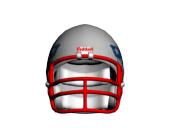New England Patriots Team History
 Billy
Sullivan Jr., a Boston businessman with a strong sports promotional
background, secured an American Football League franchise on
November 22, 1959. In keeping with the New England heritage,
the nickname "Patriots" was selected by a panel of
Boston sportswriters in a contest to name the team. The Boston
team was involved in two significant "firsts" in 1960.
The Patriots defeated the Buffalo Bills in the first AFL pre-season
game on July 30. On September 9, the Patriots lost to the Denver
Broncos 13-10 in the first-ever AFL regular-season game. Billy
Sullivan Jr., a Boston businessman with a strong sports promotional
background, secured an American Football League franchise on
November 22, 1959. In keeping with the New England heritage,
the nickname "Patriots" was selected by a panel of
Boston sportswriters in a contest to name the team. The Boston
team was involved in two significant "firsts" in 1960.
The Patriots defeated the Buffalo Bills in the first AFL pre-season
game on July 30. On September 9, the Patriots lost to the Denver
Broncos 13-10 in the first-ever AFL regular-season game.
During the Patriots' first decade, finding a suitable playing
home in the Boston area was almost as urgent as putting a competitive
team on the field. The Patriots played at Boston University
Field in the 1960 and 1961 and at Harvard in 1962 and again
in 1970. From 1963 to 1969, the Patriots played at Fenway Park,
the Red Sox baseball stadium. Then in 1971, two significant
things happened. The team changed its name to New England Patriots
and moved to a new 60,764-seat stadium in the town of Foxboro,
about 25 miles south of Boston. After two name changes, the
Stadium is now called Foxboro Stadium.
In spite of their stadium problems, the Patriots were frequent
contenders during their AFL days. Mike Holovak, who replaced
Lou Saban midway into the 1961 season, ranks as the winningest
coach in team history with a 53-47-9 record. His best season
came in 1963, when the Patriots defeated Buffalo 26-8 in a playoff
for the AFL Eastern crown. In the AFL championship game the
next week, however, they lost to San Diego 51-10. Holovak had
few stars to build a team around but Gino Cappelletti, the team's
placekicker and ace wide receiver, became the AFL's all-time
high scorer with 1,100 points, 252 coming on touchdown receptions
and the remainder on kicking. Running Back Jim Nance won AFL
rushing championships when he rushed for an AFL record 1,458
yards in 1966 and 1,216 yards in 1967.
Following a string of losing seasons after the AFL-NFL merger,
the Patriots became serious contenders in the late 1970s. The
1976 Patriots finished 11-3 and just barely lost to the eventual-Super
Bowl champion Oakland Raiders in a first-round playoff game.
They won the AFC Eastern championship in 1978 and wound up a
close second in 1979. Raymond Berry took over the coaching reins
in 1984 and led the Patriots to a 51-41-0 record the next five
and a half years. Berry's 1985 team had an 11-5 record, earned
a wild-card playoff berth and won three straight AFC playoff
games on the road and advanced to Super Bowl XX, where the Patriots
lost to the Chicago Bears. That game marked the final appearance
of guard John Hannah, who in 1991 became the first Patriot to
be elected to the Pro Football Hall of Fame.
In recent years, Patriots ownership has changed often, from
Sullivan to Victor K. Kiam II in 1988, to James B. Orthwein
in 1992 and finally to Robert Kraft in 1994. With the highly-regarded
veteran coach Bill Parcells in charge and the successful stockpiling
of quality talent through the NFL draft, the Patriots won the
AFC Championship in 1996 and earned a trip to their second Super
Bowl.
Then in 2001, with new coach Bill Belichick and surprise star
quarterback Tom Brady, the Patriots completed a miracle season,
winning Super Bowl XXXVI after a 5-5 start.
Belichick and Brady again led the Patriots to a world championship
as New England posted a 14-2 regular season records in 2003
and 2004, and marched through the playoffs.
Both seasons were capped by thrilling victories in the
Super Bowl. |